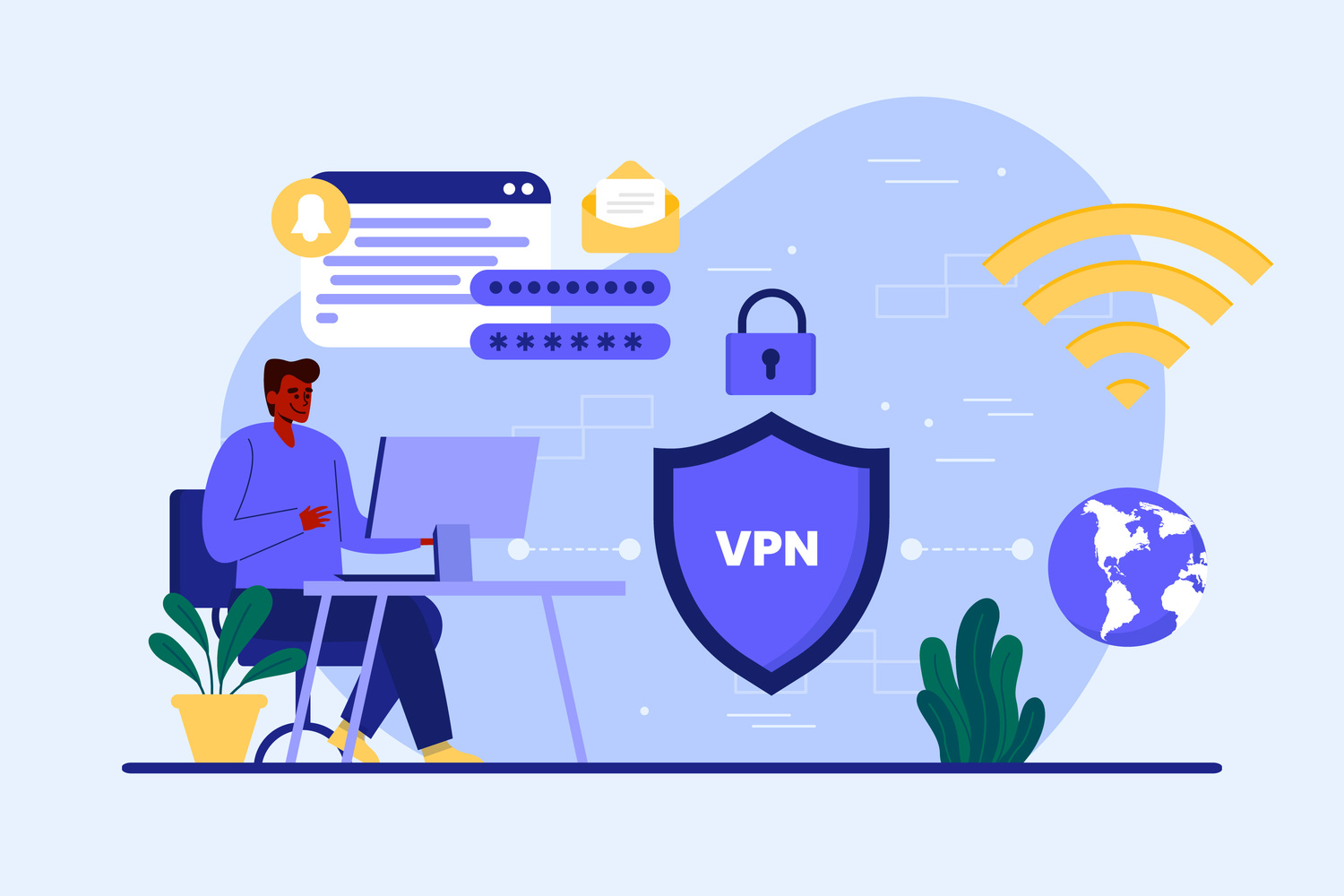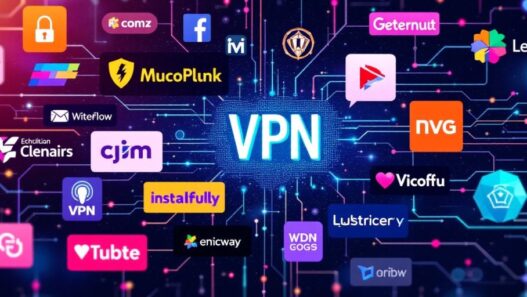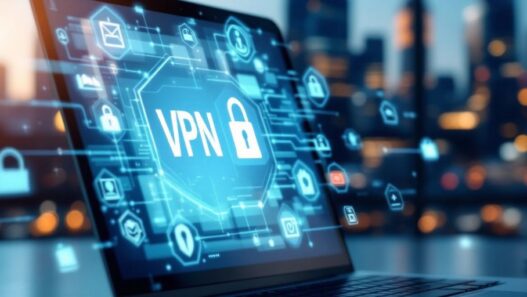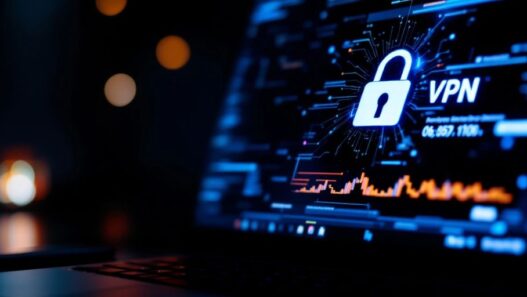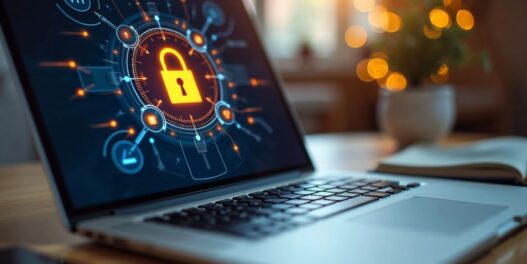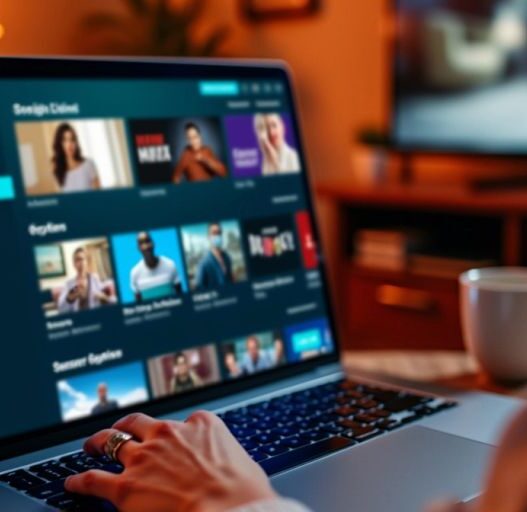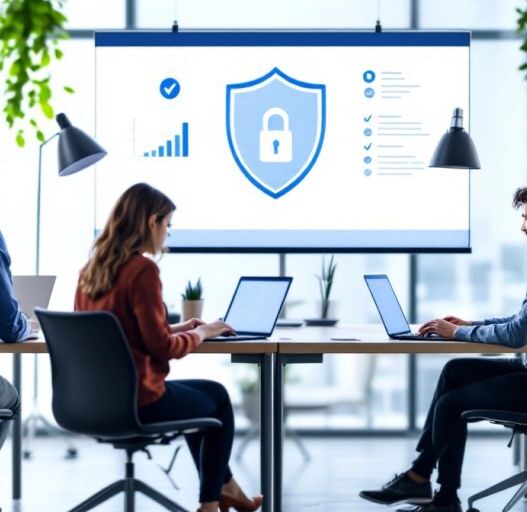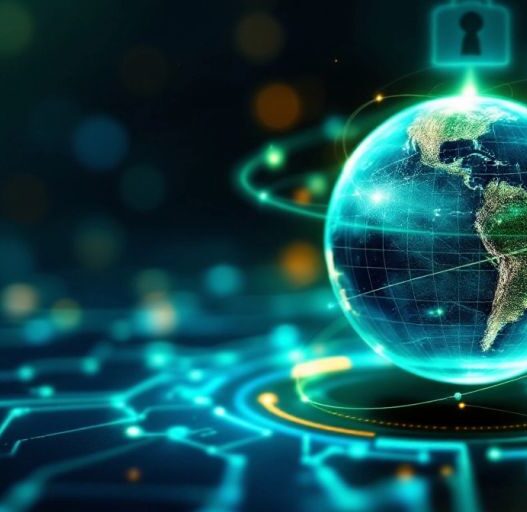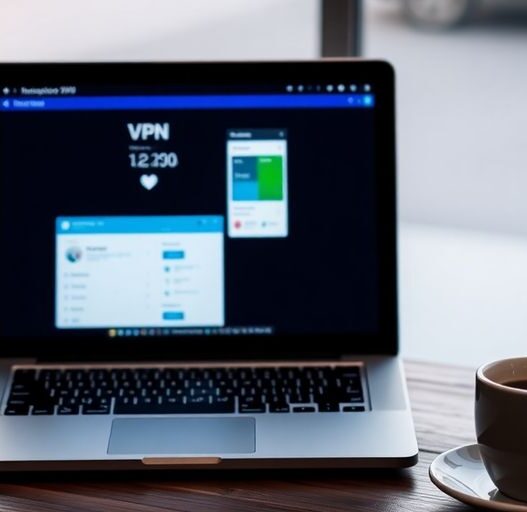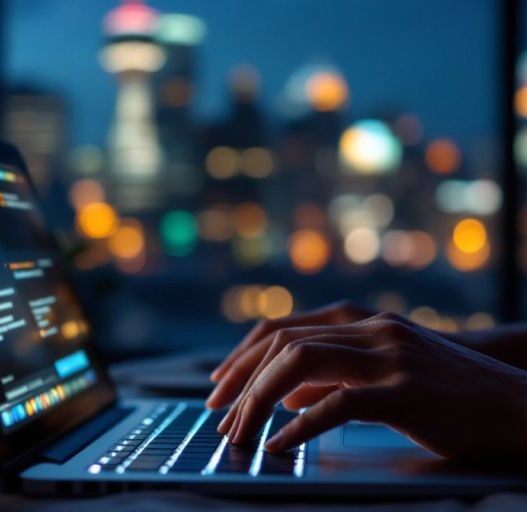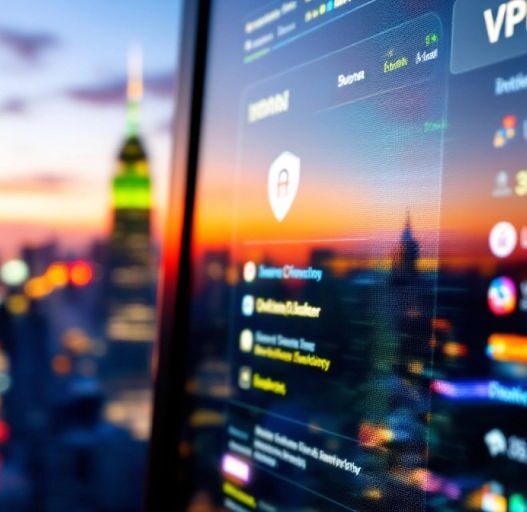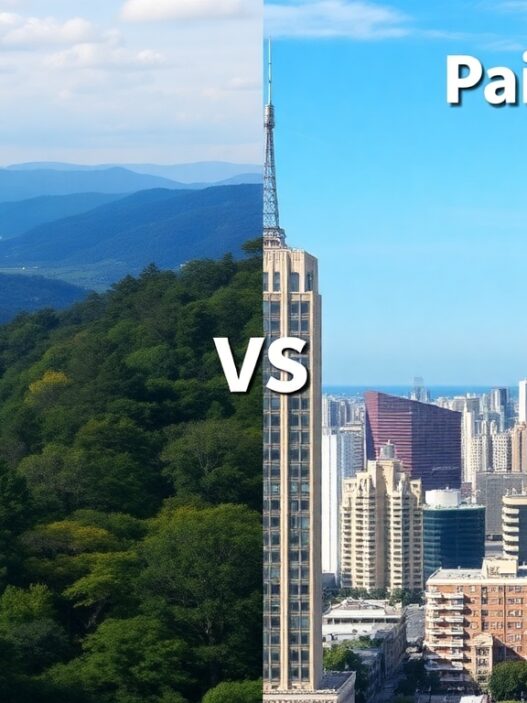A Virtual Private Network (VPN) is a powerful tool that helps keep your online activities safe and private. By creating a secure connection to the internet, a VPN hides your location and protects your personal information from prying eyes. This article will break down what a VPN is, how it works, and why it’s essential for anyone who values their online privacy.
Key Takeaways
- A VPN encrypts your internet traffic, making it unreadable to outsiders.
- It hides your IP address, helping to keep your location private.
- Using a VPN on public Wi-Fi protects you from hackers.
- VPNs allow you to access content that may be blocked in your area.
- Choosing a good VPN service is important for maximum security.
Understanding What a VPN Is
Definition of a VPN
A VPN, or Virtual Private Network, is a service that creates a secure connection over the internet. It helps keep your online activities private by encrypting your data, making it unreadable to anyone who might try to snoop on your connection. This means that your personal information stays safe from hackers and other prying eyes.
How VPNs Work
VPNs work by routing your internet traffic through a secure server. Here’s a simple breakdown of the process:
- Connection: When you connect to a VPN, your device communicates with a VPN server.
- Encryption: Your data is encrypted, which means it is turned into a code that is hard to read.
- Masking: The VPN server then sends your data to the internet, masking your real IP address with its own.
This process helps protect your identity and location while you browse the web.
Common Misconceptions About VPNs
Many people have misunderstandings about what a VPN can do. Here are a few common myths:
- VPNs are only for tech experts: Anyone can use a VPN; it’s designed to be user-friendly.
- VPNs make the internet slow: While some may experience slower speeds, many VPNs offer fast connections.
- VPNs guarantee complete anonymity: While they enhance privacy, they don’t make you completely invisible online.
A VPN is like a protective shield for your online activities, ensuring that your data remains private and secure.
How VPNs Protect Your Privacy
Encryption and Data Security
When using a VPN, your data is encrypted, which means it is turned into a code that only you and the VPN can read. This makes it very hard for anyone else, like hackers or snoopers, to see what you are doing online. Here’s how it works:
- You connect to the VPN.
- Your data is sent through a secure tunnel.
- Only the VPN server can decode your data.
IP Address Masking
A VPN also hides your real IP address. This is important because your IP address can reveal your location and identity. By masking your IP address, a VPN helps you stay anonymous online. Here are some benefits of IP address masking:
- Greater anonymity: Your online activities are harder to trace back to you.
- Access to restricted content: You can view websites that may be blocked in your area.
- Protection from tracking: Advertisers and websites can’t easily track your movements online.
Protection on Public Wi-Fi
Using public Wi-Fi can be risky because it is often not secure. A VPN protects you by encrypting your connection, making it difficult for hackers to steal your information. Here are some tips for staying safe on public Wi-Fi:
- Always use a VPN when connecting to public networks.
- Avoid accessing sensitive information, like bank accounts, on public Wi-Fi.
- Look for networks that require a password for added security.
A VPN for privacy is a smart choice for anyone who wants to keep their online activities safe and secure.
Benefits of Using a VPN

Using a VPN can greatly enhance your online experience by providing various advantages that protect your privacy and security. Here are some key benefits:
Anonymous Browsing
A VPN helps keep your online activities private. By masking your IP address, it prevents websites and advertisers from tracking your browsing habits. This means you can surf the web without being followed.
Accessing Geo-Restricted Content
With a VPN, you can bypass geographical restrictions. This allows you to access content that may be blocked in your region, such as streaming services or websites. You can enjoy your favorite shows and websites from anywhere in the world.
Enhanced Online Security
Using a VPN adds an extra layer of security to your internet connection. It encrypts your data, making it difficult for hackers to intercept your information, especially on public Wi-Fi networks. This is crucial for protecting sensitive data like passwords and financial information.
Here’s a quick summary of the benefits:
| Benefit | Description |
|---|---|
| Anonymous Browsing | Keeps your online activities private by masking your IP address. |
| Accessing Geo-Restricted Content | Allows access to content that may be blocked in your region. |
| Enhanced Online Security | Encrypts your data to protect against hackers, especially on public Wi-Fi. |
Using a VPN is a smart choice for anyone looking to improve their online safety and freedom.
Choosing the Right VPN Service

When it comes to online privacy, selecting the right VPN service is crucial. Not all VPNs are created equal, and making the wrong choice can lead to security risks or poor performance. Here are some key factors to consider:
Key Features to Look For
- Price: Look for a VPN that fits your budget. Most services offer monthly or yearly plans.
- Data Allowance: Check if there are limits on data usage, especially if you plan to stream videos or download large files.
- Reputation: Choose a well-known provider with positive reviews to ensure your data is safe.
- Server Locations: A wide range of server locations can help you access content from different countries.
- Privacy Policy: Make sure the VPN has a strict no-logs policy to protect your data.
Popular VPN Providers
| Provider | Price (Monthly) | Key Features |
|---|---|---|
| ExpressVPN | $12.95 | Fast speeds, strong encryption |
| NordVPN | $11.95 | Large server network, no logs |
| Surfshark | $12.95 | Unlimited devices, budget-friendly |
Cost vs. Benefits Analysis
- Evaluate Your Needs: Determine what you need from a VPN, such as streaming or enhanced security.
- Compare Prices: Look at different providers and their features to find the best value.
- Read Reviews: Check user feedback to see how well the VPN performs in real-world scenarios.
Choosing the right VPN can significantly enhance your online security and privacy. Take your time to research and find a service that meets your needs.
Potential Drawbacks of VPNs
While VPNs offer many benefits, they also come with some drawbacks that users should be aware of.
Speed and Performance Issues
Using a VPN can sometimes slow down your internet connection. This happens because your data has to travel through the VPN server, which can add extra time. Some users may notice a lag, especially if the VPN server is busy.
Legal and Ethical Considerations
Not all VPNs are created equal. Some may not respect user privacy and could log your data. It’s important to choose a reputable provider that has a strict no-logs policy. Users should be cautious, as some free VPNs may track online activity and sell that information.
Limitations in Anonymity
While VPNs can help mask your IP address, they are not foolproof. There can be leaks that expose your real IP address. Users should look for VPNs that have features to prevent these leaks.
Choosing the right VPN is crucial. A poor choice can lead to privacy risks rather than protection.
In summary, while VPNs can enhance online privacy, users should consider these potential drawbacks:
- Slower internet speeds due to data encryption.
- Possible data logging by untrustworthy providers.
- Risk of IP leaks that can compromise anonymity.
Setting Up and Using a VPN
Setting up a VPN can seem tricky, but it’s usually a straightforward process. Here’s how to get started:
Installing a VPN on Different Devices
- Choose a VPN Provider: This is often the hardest part. Consider your budget, data usage, and the locations you want to access. Take your time to find a reliable service that fits your needs.
- Download the VPN App: Most providers have apps for various devices. For example:
- Windows PC
- Mac
- iPhone/iPad
- Android Phones
- Install the App: Follow the instructions for your device to install the app. After installation, log in with your username and password.
Configuring VPN Settings
- Select a Server Location: Choose a server in the country you want to appear to be in. This helps in accessing geo-restricted content.
- Adjust Security Settings: Make sure your VPN is set to the highest level of encryption for better protection.
- Enable Features: Some VPNs offer additional features like a kill switch, which disconnects you from the internet if the VPN fails.
Troubleshooting Common Issues
- Connection Problems: If you can’t connect, check your internet connection and try a different server.
- Slow Speeds: If your internet is slow, try switching servers or checking your VPN settings.
- App Crashes: Restart the app or reinstall it if it keeps crashing.
Using a VPN is a great way to protect your online privacy. Once set up, it runs in the background, keeping your data safe, especially on public Wi-Fi.
Advanced VPN Features

Kill Switch
A kill switch is a crucial feature for any VPN. It automatically disconnects your internet if the VPN connection drops. This prevents your real IP address from being exposed. Users can feel secure knowing that their data remains protected even during unexpected disconnections.
Split Tunneling
Split tunneling allows users to choose which apps or websites go through the VPN and which do not. This can help improve speed and performance. For example, you might want to use the VPN for sensitive tasks while accessing local content without it. Here are some benefits of split tunneling:
- Improved speed for non-sensitive activities.
- Flexibility in managing data usage.
- Enhanced control over online privacy.
Multi-Hop Connections
Multi-hop connections route your data through multiple servers before reaching its final destination. This adds an extra layer of security, making it harder for anyone to track your online activities. It’s especially useful for users who prioritize privacy.
Using advanced features like a kill switch, split tunneling, and multi-hop connections can significantly enhance your online security and privacy.
In summary, understanding these advanced VPN features can help users make informed choices about their online safety. With the right VPN definition and VPN encryption, users can enjoy a more secure internet experience.
Final Thoughts on VPNs and Your Privacy
In conclusion, using a VPN is a smart way to keep your online activities safe and private. It creates a secure connection that hides your personal information from prying eyes, especially when you’re on public Wi-Fi. While no tool can guarantee complete anonymity, a VPN significantly reduces the chances of your data being stolen or tracked. Whether you’re browsing, shopping, or streaming, a VPN helps you enjoy the internet more freely and securely. So, if you care about your online privacy, consider trying out a VPN service today!
Frequently Asked Questions
What is a VPN and why do I need one?
A VPN, or Virtual Private Network, helps keep your online activities private and secure by creating a safe connection to the internet. It’s useful for protecting your personal data, especially when using public Wi-Fi.
How does a VPN protect my data?
A VPN protects your data by encrypting it, which means it turns your information into a code that is hard for others to read. This way, even if someone tries to intercept your information, they won’t be able to understand it.
Can I be tracked if I use a VPN?
While a VPN makes it harder to track you, it doesn’t make you completely invisible. Your internet service provider can see that you’re using a VPN, but they can’t see what you’re doing online.
Is using a VPN legal?
Yes, using a VPN is legal in most countries. However, some places have restrictions on VPN usage, so it’s important to check local laws.
Are there any downsides to using a VPN?
One downside is that using a VPN can slow down your internet speed. Also, not all VPNs are trustworthy, so it’s important to choose a reliable service.
How do I choose the best VPN for me?
Look for a VPN that offers good security features, has a no-log policy, and is easy to use. Reading reviews and comparing prices can also help you make a decision.
